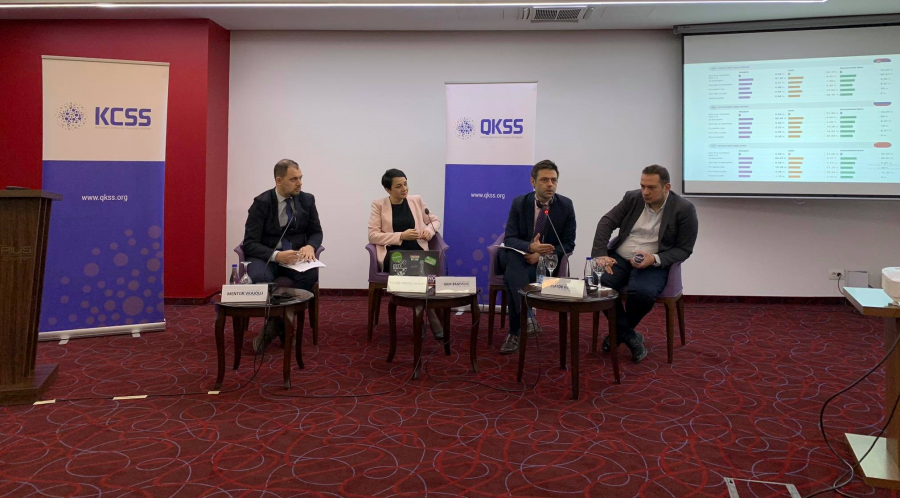14/02/2020

Kosovar Centre for Security Studies (KCSS) today, on 14th of February 2020, has organized the conference: “Final Stage: Restarting Kosovo-Serbia Dialogue” in the framework of the Kosovo Security Barometer Program.
During this conference, the Special Edition of Kosovo Security Barometer was published, deconstruction the opinions of Kosovo citizens regarding the risks to national security, the dialogue between Kosovo and Serbia, Kosovo's customs tariffs on Serbia and Bosnia and Herzegovina and what respondents think onthe possibility of implementing Kosovo's full reciprocity with Serbia. Panelists at this conference were:
Mrs. Fitore Pacolli-Dalipi, Member of the Assembly of the Republic of Kosovo;
Mr. Igor Bandovic, Director of the Belgrade Center for Security Policy (BCSP);
Mr. Plator Avdiu, Researcher at Kosovar Center for Security Studies (KCSS)
Plator Avdiu, a researcher at KCSS, has presented the findings of the report, where according to citizens surveyed in Kosovo, the phenomenon of corruption in Kosovo is perceived as the highest risk to the national security of the state of Kosovo. The vast majority or 91.41 percent of the respondents, perceive corruption as the biggest internal risk in Kosovo. Unemployment (90.98 percent) ranks second and organized crime (89.31 percent) ranks third as a threat to Kosovo's national security.
Regarding topical issues related to the Kosovo-Serbia dialogue, such as the division of Kosovo or the territorial exchange between Kosovo and Serbia (78.48 percent) and the territorial autonomy for Kosovo/Association of Serb Municipalities (64.61 percent) are highly perceived as national security risks by respondents.
Despite this, the majority of respondents are in favor of continuation of the dialogue, with almost 50 percent of respondents stating that the dialogue should continue. Meanwhile, 21 percent of respondents said that the dialogue should be conditioned towards Serbia for recognizing Kosovo's independence and war crimes committed in Kosovo during the war. About 15 percent of the respondents expressed that the dialogue should not continue.
Regarding Kosovo's customs tariffs to Serbia and Bosnia and Herzegovina, respondents expressed different views on whether the tax should remain or whether reciprocity measures should be applied against Serbia. The perception of 35.32 percent of respondents is that tariffs should remain in place, while 32.97 percent of respondents expressed the opinion that tariffs should be replaced by the application of full Kosovo reciprocity measures against Serbia. Despite this, about 22 percent of respondents said tariffs on Serbia should be removed by the Kosovo Government.
Asked whether customs tariffs have faded Kosovo's relations with international partners, respondents expressed different views. Thus, about 33.47 percent of respondents disagree that tariffs fade Kosovo's relations with international partners. However, about 30.28 percent of them somewhat agree and the other 27.33 percent agree that Kosovo's customs duties to Serbia have faded Kosovo;s relations with international partners.
In terms of Kosovo's foreign policy, according to the overwhelming majority of respondents, Germany (79.85 percent), the United States (78.60 percent), Albania (69.69 percent) and the United Kingdom (62.85 percent) are Kosovo's friendliest states and rank as Kosovo's most strategic allies and partners. Whereas, Serbia is considered as the state with the most harmful impact on Kosovo by 89.86 percent of the respondents, followed by Russia (81.35 percent) and China (59.61 percent).
On the other hand, Mrs. Fitore Pacolli-Dalipi, Member of Parliament from Vetevendosje Movement who was a panelist at the conference, stated that the findings of the report published by KCSS reflect the current situation in Kosovo. According to her, the priority for the citizens of Kosovo is the fight against corruption and organized crime and the rule of law, which is also reflected in the Kosovo Security Barometer survey. Regarding the Kosovo-Serbia dialogue, she stated that the Kurti Government will not hurry and that no deadlines should be set for reaching the final agreement between Kosovo and Serbia.
Furthermore, MP Pacolli-Dalipi said that one of the priorities of the Government of Kosovo will be the establishment of full reciprocity towards Serbia, while mentioning that Kosovo's internal dialogue with members of the Serb community in Kosovo should also begin. She noted that Kosovo institutions are not under pressure from international partners to remove the tax on Serbia in order to restart dialogue with Serbia.
Meanwhile, Mr. Igor Bandovic, the director of the Belgrade Center for Security Policy (BCSP), stressed that relations between Kosovo and Serbia are still characterized by old animosities that are hampering both countries in normalizing mutual relations. In this regard, according to him, Serbia still dominates nationalist discourse on Kosovo. He stressed that Kosovo and Serbia can learn much from the example of Northern Macedonia that has reached agreement with Greece on the constitutional name issue, though the cases differ. Similar to Kosovo, Bandovic has said that in Serbia, the most important issue for Serbian citizens is the fight against corruption, the rule of law and economic and democratic development.
This conference was moderated by KCSS Executive Director Mr. Mentor Vrajolli, while the Kosovo Security Barometer survey was conducted by the KCSS research team during October 2019.
This report is published in the framework of the Kosovo Security Barometer Programe. Perceptions presented in this report are a summary of information gathered from respondents and it solely demonstrates how people perceive institutions. It is no way a conclusive assessment on the quality of the work of institutions subject to this study. It shall serve as an instrument to them toward addressing potential shortcomings, but also an indicator of the effectiveness of their communication with the people.
The views presented in this report are perceptions of the respondents and do not necessarily represent the views of Kosovar Centre for Security Studies. Opinions expressed in this report do not represent the views of the National Endowment for Democracy (NED).